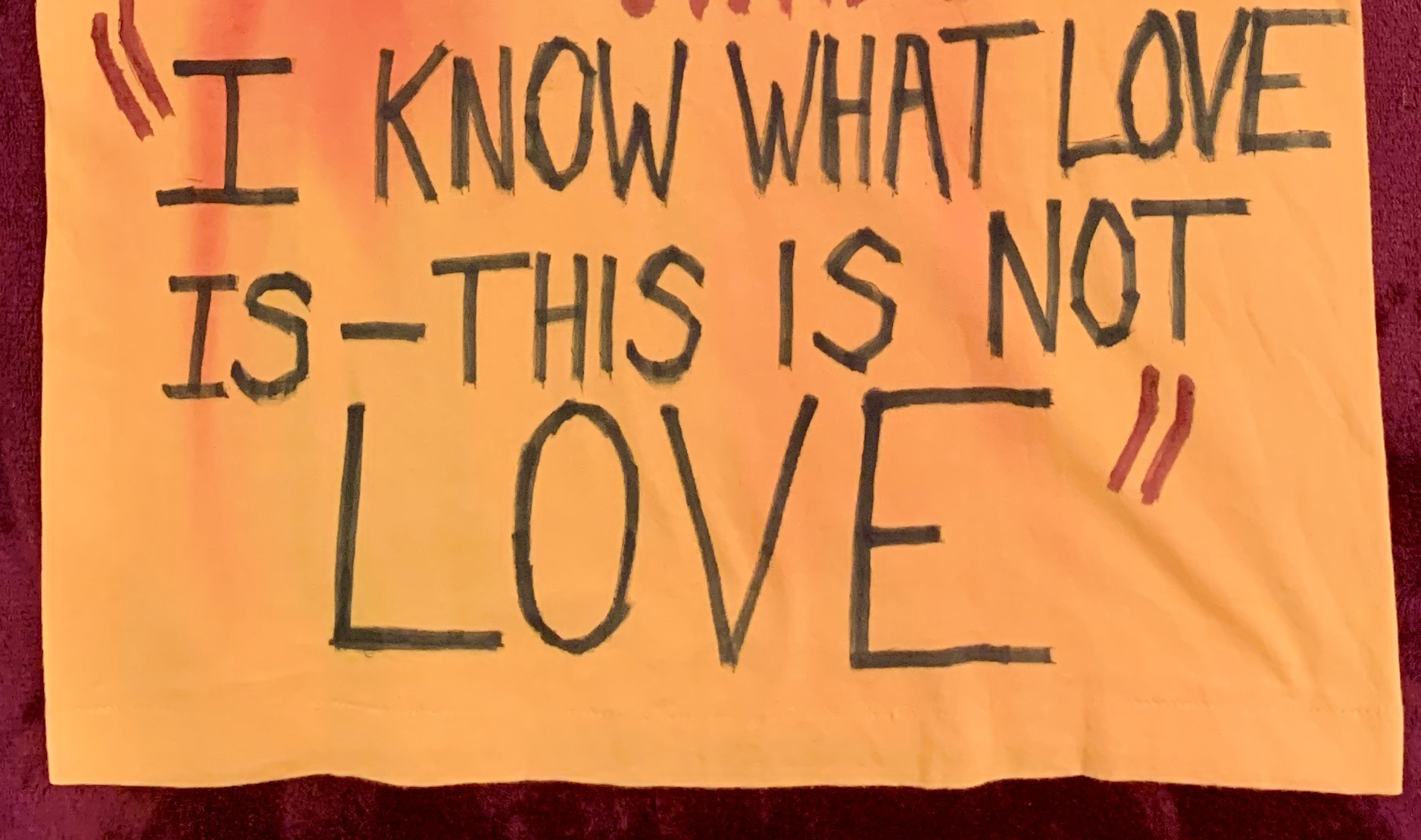
Content warning: these pieces of art, created by survivors of gender-based violence, convey a wide range of emotions and experiences. Some are raw and angry, full of pain. Others are hopeful and speak of healing. If you feel that the content of this display would be difficult for you, we advise that you consider viewing it on another occasion. If you do choose to view it, and you find that your emotions are elevated as a result, please find someone to speak with as soon as possible. Our site offers links to local resources and national sexual assault or domestic violence hotlines. Or, if you are at UVA and would like to speak to a confidential advocate, please email [email protected].
In observance of Denim Day on April 29, 2020, our Gender Violence & Social Change team is sharing images of their Clothesline Project online in lieu of their usual public installation on the Lawn at the University of Virginia, due to the COVID-19 sequestration.
The UVA Clothesline Project began in 1993 in partnership with the Sexual Assault Resource Agency and Shelter for Help in Emergency as a chapter of the National Clothesline Project, which was founded in 1990. The National Clothesline Project was developed as a means for survivors of gender-based violence to share a message about their experiences in a public way that didn’t reveal their identities and was displayed the way laundry historically has been on display: on a clothesline.
The original purpose of the project was four-fold:
- To bear witness to the survivors as well as the victims of the war against women;
- To help with the healing process for people who have lost a loved one or who are survivors of this violence;
- To educate, document, and raise society’s awareness of the extent of the problem of violence against women;
- To provide a nationwide network of support, encouragement and information for other communities starting their own Clothesline Projects.
Since that time, the project has expanded to include male survivors and LGBTQ+ and GNC survivors and victims of gender-based violence. Today, SARA, SHE and UVA have their own collections of shirts. Image here are from UVA’s collection.
View images of our clothesline project shirts and express support for survivors on our social media channels @uvawomenscenter. You are invited to make comments (no trolls, please) at the end of this post if you wish. You can also find instructions below to add your own t-shirt to this collection for future exhibits.
 |
 |
What is Denim Day?
Denim Day asks community members, elected officials, businesses and students to make a social statement with their fashion statement by wearing jeans on this day as a visible means of protest against the misconceptions that surround sexual violence. It is an annual awareness campaign held on a Wednesday in April (this year it is on April 29) in honor of Sexual Assault Awareness Month.
The Denim Day story began in Italy in 1992, when an 18-year old girl was raped by the 45-year old driving instructor who was taking her to her very first driving lesson. He took her to an isolated road, pulled her out of the car, removed her jeans and forcefully raped her.
She reported the rape and the perpetrator was arrested and prosecuted. He was then convicted of rape and sentenced to jail. Years later, he appealed the conviction claiming that they had consensual sex. The Italian Supreme Court overturned the conviction and the perpetrator was released. A statement from the Court argued that because the victim was wearing very tight jeans, she had to help him remove them, and by removing the jeans it was not rape but consensual sex. This became known throughout Italy as the “jeans alibi.”
Enraged by the verdict, the women in the Italian Parliament launched a protest wearing jeans on the steps of the Supreme Court. This protest was picked up by international media which inspired the California Senate and Assembly to do the same on the steps of the Capitol in Sacramento. Patti Occhiuzzo Giggans, Executive Director of Peace Over Violence in Los Angeles, saw this in the media and thought everyone should be wearing jeans to protest all of the myths about why women and girls are raped. The first Denim Day event was held in April of 1999 and it has continued annually since. Today it is observed not only in communities and on campuses all over the United States, but events are held worldwide. The University of Virginia is proud to participate in this event annually, in honor of survivors everywhere, and especially those who live, work and study in our close-knit community.
How Do I Add My Shirt to the Clothesline Project?
You may use one of your own shirts—it doesn’t have to be a t-shirt (but it does have to be some kind of top). Michael’s and other art supply stores sell blank t-shirts of many colors for decorating, as well as fabric paints and other supplies.
There are some guidelines that are important to follow:
- Male, LGBTQ+ and GNC survivors are welcome to contribute to the collection.
- If you want to make a shirt for a victim of homicide, you must have permission from their family in writing when you bring or mail your shirt to the Maxine Platzer Lynn Women’s Center.
- Please use waterproof materials. That means waterproof pens, permanent glue (or sewing, which is always better), no paper or other water-soluble materials.
- Fabric markers are fine, but they don’t work well. Fabric paints last longer and are more colorful.
- Sew on anything that you want to attach. Glue doesn’t hold for long.
- Do not use names on your shirt, unless you are honoring a homicide victim.
Mail your completed shirt to the Maxine Platzer Lynn Women’s Center at 1400 University Avenue, Charlottesville VA 22908-0588. Please pin on a piece of paper with your name and contact information. We will keep that in a file separately from your shirt and it will never be used publicly. We want to be able to reach you if your shirt gets damaged, and also to honor your contribution. If you feel more comfortable, just give us your first name.
You may add your shirt to the collection at any time. It is on display in October for Domestic Violence Awareness Month, and sometimes in April during Sexual Assault Awareness Month.
For more information, contact the Gender Violence & Social Change Program at the Maxine Platzer Lynn Women’s Center: 434-982-2774.
 |
 |

